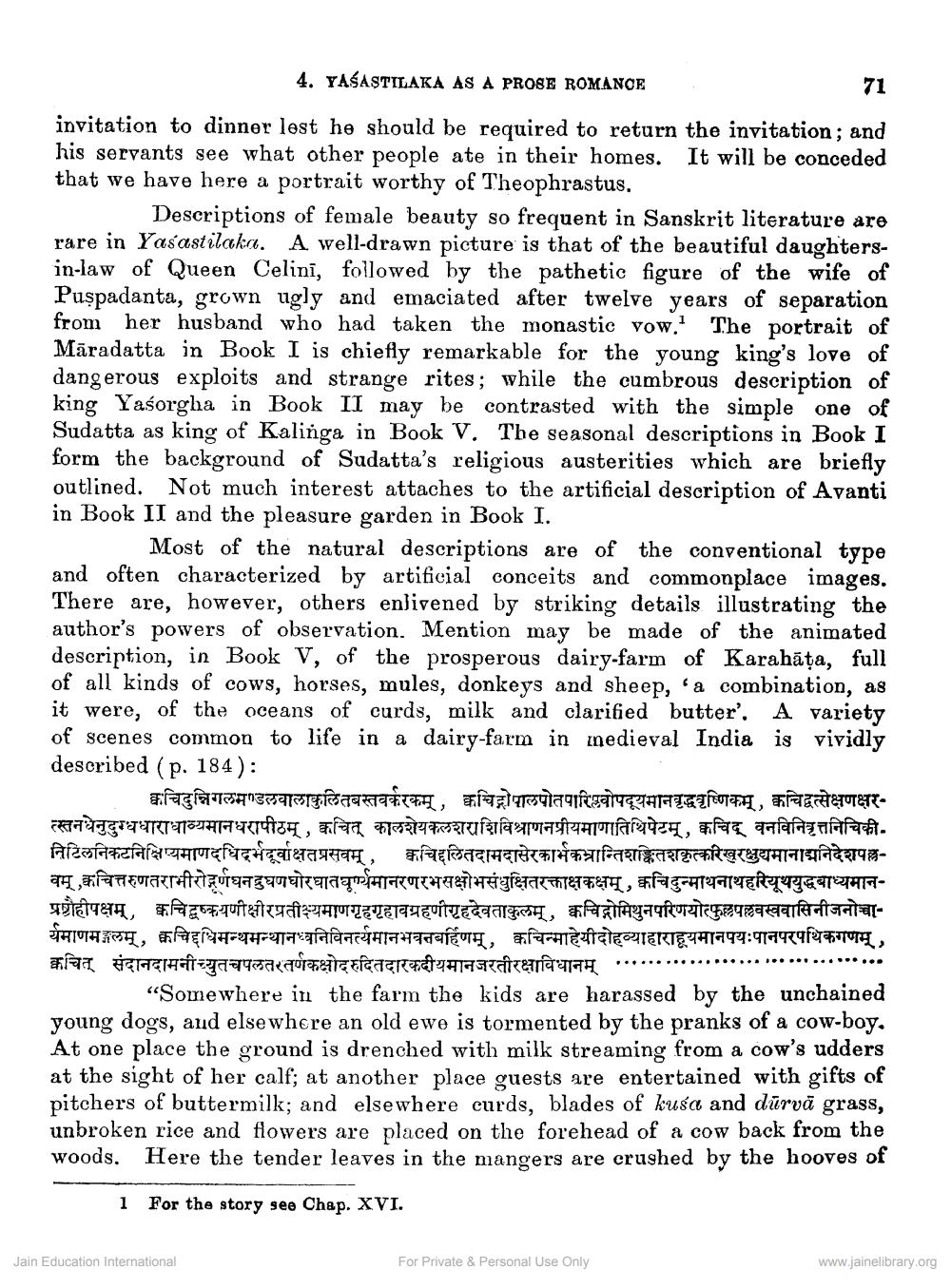________________
4. YASASTILAKA AS A PROSE ROMANCE
71
invitation to dinner lest he should be required to return the invitation; and his servants see what other people ate in their homes. It will be conceded that we have here a portrait worthy of Theophrastus.
Descriptions of female beauty so frequent in Sanskrit literature are rare in Yasastilaka. A well-drawn picture is that of the beautiful daughtersin-law of Queen Celini, followed by the pathetic figure of the wife of Puspadanta, grown ugly and emaciated after twelve years of separation from her husband who had taken the monastic vow.1 The portrait of Maradatta in Book I is chiefly remarkable for the young king's love of dangerous exploits and strange rites; while the cumbrous description of king Yasorgha in Book II may be contrasted with the simple one of Sudatta as king of Kalinga in Book V. The seasonal descriptions in Book I form the background of Sudatta's religious austerities which are briefly outlined. Not much interest attaches to the artificial description of Avanti in Book II and the pleasure garden in Book I.
Most of the natural descriptions are of the conventional type and often characterized by artificial conceits and commonplace images. There are, however, others enlivened by striking details illustrating the author's powers of observation. Mention may be made of the animated description, in Book V, of the prosperous dairy-farm of Karahața, full of all kinds of cows, horses, mules, donkeys and sheep, a combination, as it were, of the oceans of curds, milk and clarified butter'. A variety of scenes common to life in a dairy-farm in medieval India is vividly described (p. 184):
क्वचिदुन्निगलमण्डलवालाकुलितबस्तवर्करकम् क्वचिगोपालपोत पारिप्लवोपद्यमान वृद्धवृष्णिकम्, क्वचिद्वत्सेक्षणक्षरत्स्तनधेनुदुग्धधाराधाव्यमानधरापीठम्, क्वचित् कालशेयकलशराशिविश्राणनप्रीयमाणातिथिपेटम्, क्वचिद् वनविनिरृत्तनिचिकी. निटिलनिकटनिक्षिप्यमाणदधिदर्भदूर्वाक्षतप्रसवम् क्वचिद्दलितदामदासेर कार्भ कभ्रान्तिशङ्कितशकृत्करिखुरक्षुद्यमानाद्मनिदेशपलवम्,क्वचित्तरुणतराभीरोद्द्भूर्णघन दुघण घोरघात घूर्ण्यमानरणरभ सक्षोभसंधुक्षितरक्ताक्षकक्षम्, क्वचिदुन्माथनाथहरियूथयुद्धबाध्यमानप्रष्टौहीपक्षम् क्वचिद्वष्कयणीक्षीर प्रतीक्ष्यमाणगृहगृहावग्रहणीगृहदेवताकुलम् क्वचिद्गोमिथुन परिणयोत्फुल्लपल्लवस्ववासिनीजनोच्चार्यमाणमङ्गलम्, क्वचिद्दधिमन्थमन्थानध्वनिविनर्त्यमानभवतबर्हिणम्, कचिन्माहेयी दोहव्या हाराहूयमानपयःपानपरपथिकगणम्, क्वचित् संदानदामनीच्युत चपलतस्तर्णकक्षोद रुदित दारकदीयमान जरतीरक्षाविधानम्
"Somewhere in the farm the kids are harassed by the unchained young dogs, and elsewhere an old ewe is tormented by the pranks of a cow-boy. At one place the ground is drenched with milk streaming from a cow's udders at the sight of her calf; at another place guests are entertained with gifts of pitchers of buttermilk; and elsewhere curds, blades of kusa and dūrvā grass, unbroken rice and flowers are placed on the forehead of a cow back from the woods. Here the tender leaves in the mangers are crushed by the hooves of
For the story see Chap. XVI.
1
Jain Education International
For Private & Personal Use Only
www.jainelibrary.org




